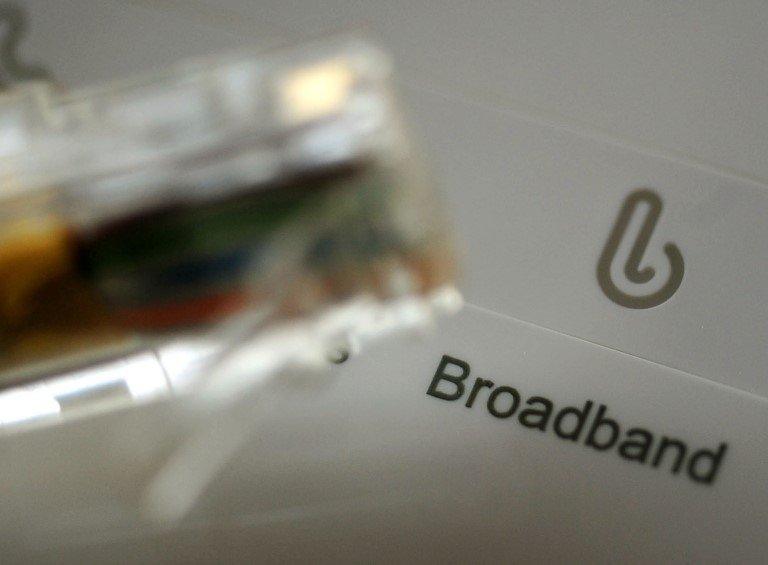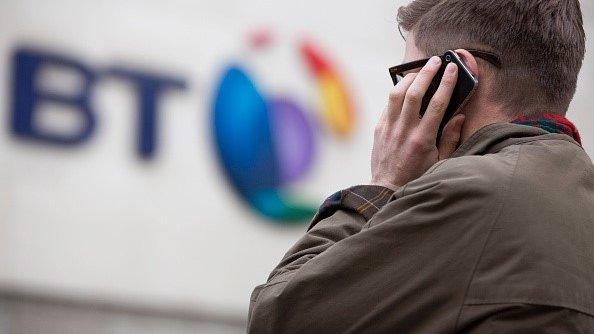Ofcom warns BT change is ahead over internet provision
- Published

The status quo between BT and its subsidiary Openreach, which provides the infrastructure connecting people to the internet, is unlikely to continue warns the head of the telecoms regulator, Ofcom.
Critics of BT say it has not invested enough in Openreach and want it sold.
Ofcom's chief executive, Sharon White, is currently reviewing the company's provision of superfast broadband.
She said one option was "the structural separation" of Openreach from BT.
Ms White explained this was among four possible options being explored. They are:
Whether to maintain the status quo which she said was "unlikely."
More deregulation.
The "structural separation" of Openreach and BT - in particular whether Openreach could be spun out more fully from BT.
Adjusting the existing system to make it "more fit for purpose". That could include improving services, repairs, and laying new superfast lines.
BT is responsible for connecting almost all households to the network regardless of their service provider, as well as improvements to and maintenance of the network.
Ms White said the UK was doing fairly well in rolling out superfast broadband compared with other major European economies which suggests a split is not a foregone conclusion.
But she said it was unacceptable that 2.5 million homes did not have access to minimal broadband speeds of 10 megabits per second.
The UK government has promised that internet providers will be legally obliged to provide this speed to everyone who wants it by 2020.
Ofcom completed the first phase of its digital communications review in the summer and is expected to report its recommendations next year.

Analysis: Rory Cellan-Jones, technology correspondent
Ms White, a high-flying Treasury civil servant before she arrived at Ofcom, is used to making these kind of decisions, though not under quite the same spotlight.
When I interviewed her she told me that Ofcom was still examining all options - but suggested that she was minded to act rather than let things carry on as before:
" I think there will be change," she tells me. "We're looking at a number of options, but I think it is very unlikely we will conclude that the status quo which has worked over the last 10 years is where we are likely to be over the next decade."
Now, it is still far from certain that Ofcom's Sharon White will recommend that Openreach is split off - and the digital minister Ed Vaizey has already indicated that the government is sceptical about such radical action. But BT knows that it is now under the microscope of a regulator determined to prove that it is the consumer's friend.

Previously Openreach's chief executive Joe Garner has defended their record saying they were installing broadband throughout the country at a "tremendous" rate.
BT has always maintained splitting off the Openreach division would be a "mistake", saying only a company the size of BT can ensure future delivery.
A spokesperson for BT said in a statement: "The UK's broadband market compares well with other major European countries, but it has also changed beyond recognition in the past decade and regulation needs to be updated to reflect that."
"We believe the current model works extremely well but there is always room for improvement and for deregulation given the UK market is now far more competitive than it was a decade ago."
Rivals within the industry, who have complained of poor quality of service, slow installation times and repairs, believe dramatic change is needed.
A Vodafone spokesperson said: "Regulators must decide. Either break up BT and get the true competitive fibre Britain needs to compete with the world.....or let BT recreate its monopolist past and watch Britain's economy fade away."
Following Ofcom's last strategic review 10 years ago, BT was obliged to create Openreach, which gives competing providers equal access to its telephone and broadband network.
Essentially, those providers, such as Sky and Vodafone, pay a wholesale price to BT for use of the network and then charge telecoms customers for services.
- Published1 December 2015
- Published17 August 2015

- Published16 July 2015

- Published16 July 2015